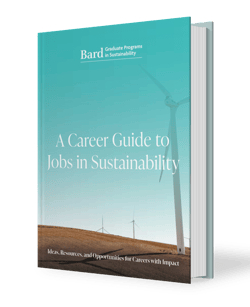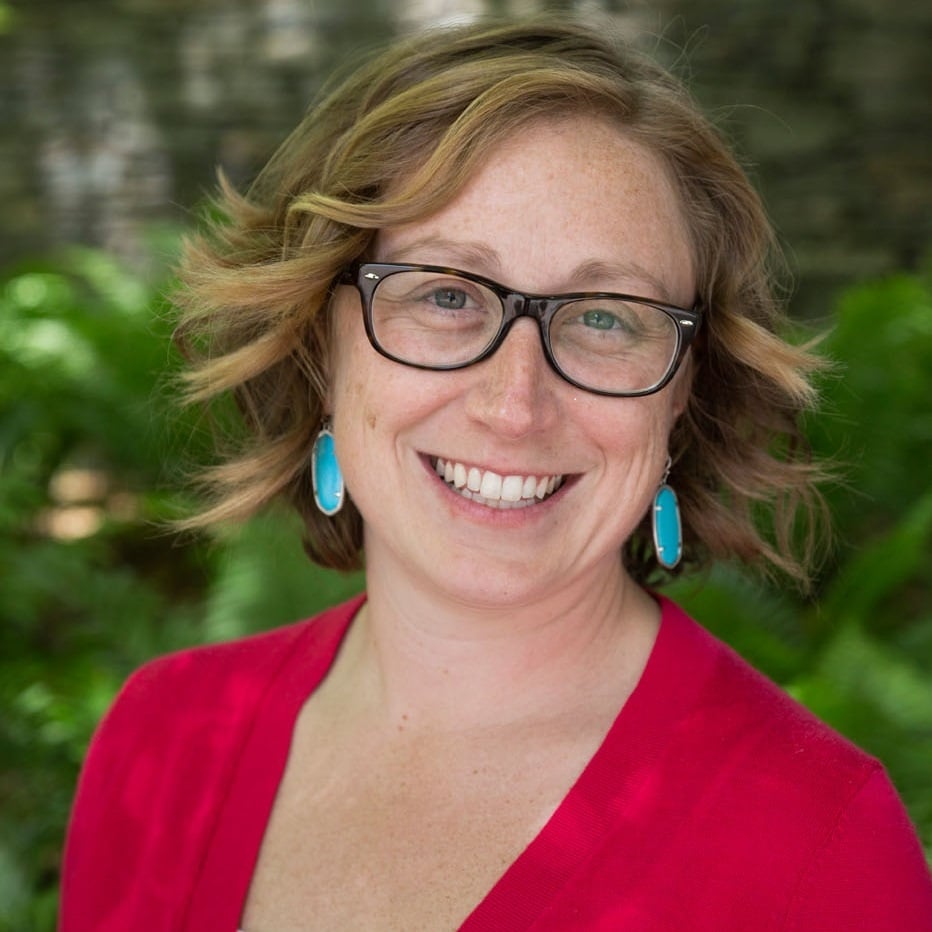Green Jobs: What to Do with a Master of Science in Sustainability

In Key West, Fla., officials are preparing to elevate streets, despite financial shortfalls. With sea levels rising, the area has been plagued by what feels like perpetual flooding. And they are not alone - in mid-June of this year, the Arctic Circle recorded temperatures as high as 118 ℉.
The effects of global warming and climate change can be seen everywhere. With that in mind, has the question, “What can I do about climate change?” gotten even more pressing for you?
Climate and environmental activism is crucial to enacting change, but for some activists, it’s not enough. Many want to turn that passion into a job and decide to pursue careers in saving the environment.
But what do those green jobs look like? And are they worth the extra education you’ll need to be able to do those jobs?
What’s the value of one of the best environmental sustainability graduate programs?
Even if you’re an avid environmental activist, you may not have all the tools, knowledge, and skills you need to succeed in a green job. An education at Bard Graduate Programs in Sustainability will give you the foundation required to succeed in any environmental jobs you might come across.
Take a look at some of the courses offered in a master of science in sustainability program.
M.S. in Environmental Policy
Our M.S. in Environmental Policy ranks among the best environmental policy master’s degrees in the business. That’s because our courses link natural ecosystems and their functioning to the impact of socioeconomic activities and to the political, institutional, and legislative responses that address environmental issues.
Bard uses case studies, joint class sessions, field trips, guest lectures, and conferences to take theory and make it practical. Here are some course highlights from the program:
|
Environmental Science of Natural and Built Environments Scientifically savvy individuals make better policy analysts, environmental activists, and entrepreneurs. This class aims to give students the scientific foundation they need: the vocabulary, methodology, and critical thinking skills. The course covers a wide range of topics, including geology, soil science, hydrology, ecology, environmental chemistry, and atmospheric science. |
Environmental Policy I and II In this course, you’ll analyze the dynamic and complex relationship among various factors—legal, political, cultural, ethical—that influence the environmental policy-making process. While you gain the core concepts of environmental policymaking, you’ll also learn to define the environmental problem, set the environmental agenda, and present and implement policy solutions. As well as answer the question: how do technology, private and public interests, and equity considerations affect all this? |
Learn more about the M.S. in Environmental Policy program>>
M.S. in Climate Science and Policy
A master’s degree in climate change and sustainable development focuses more on the interplay between climate systems, ecosystems, and agricultural systems on the one hand, and solutions on the other. Our M.S. in Climate Science and Policy program trains climate scientists and future policy leaders in guiding efforts in greenhouse gas mitigation and adaptation.
See some course highlights below.
|
Climate and Agroecology What are the connections between the agroecosystems and the climate system? How do genetically modified crops affect future food production? To answer these questions, you’ll look into projections for climate change impacts on crop production using crop simulation models. Then, you’ll discuss the role agriculture can play in climate change mitigation—considering the large greenhouse gas emissions associated with farming systems. You’ll explore soil carbon management, various emission reduction strategies (and their trade-offs), and strategies being put forth regarding climate change adaptation. |
Climate Change and Water Without a doubt, climate change has a huge impact on the water resources available for human use, altering the global hydrologic cycle. This course draws upon the physical science of hydrology, the biological science of ecosystem ecology, and the social science of water resource management. Covering a broad range of water quality and quantity issues, you’ll gain a thorough knowledge of climate, land-use change, and aquatic ecosystems. And you’ll try to answer the question: how do we rise to the challenge to meet the human and ecological demand for water in this changing world? |
Learn more about the MS in Climate Science and Policy Program>>
Sustainability careers and green jobs
There is no shortage of jobs in the environmental field. Sustainability is a growing need across industries, as are sustainability professionals.
Environmental policy jobs
It comes as no surprise that when you get a Master’s in Environmental Policy or a Master’s in Climate Science and Policy, you might find yourself in a policy job. Working in the government is one of the most direct ways to fight climate change, whether by writing laws, encouraging innovation in renewable energy, or any of the myriad ways to address environmental issues.
Here are a few job titles you can expect to see:
Environmental Policy Analyst
An Environmental Policy Analyst is one of the more common entry-level environmental jobs. As a Policy Analyst, you’ll research the data, relationships, and policy developments encompassing environmental issues and potential solutions. Analysts often use advanced statistical techniques and analytical models to make recommendations for legislation, awareness campaigns, and fundraising approaches.
Nick Martin graduated from Bard in 2013 with his Master’s in Climate Science and Policy. He credits his first position out of school—as a Policy Analyst at Pace Energy and Climate Center (PECC)—with the internships he was able to get through the Bard Center for Environmental Policy (CEP).
“During my time at Bard CEP, I was supported in securing two internships at leading environmental think tanks: one at the World Resources Institute in Washington, D.C., and the other at Developmental Alternatives in New Delhi, India.”
Both internships provided him with invaluable experiences. He gained insight on policy research quality issues in D.C. and climate adaptation and food security issues in India. This broad background helped him secure his first position at Pace, and he’s gone on to work at Dunsky Energy + Climate Advisors as a Consultant since then.
Policy Advisor
As far as environmental policy careers go, being a Policy Advisor is similar to being a Policy Analyst: you’ll be knee-deep in researching environmental issues and their potential solutions. As a Policy Advisor, however, you may be doing more lobbying and advocacy work. You’ll need to be an environmental policy expert, but with the interpersonal skills to create and maintain relationships that can help you get legislation passed.
Jackson Morris completed his Master’s in Environmental Policy at Bard in 2007. While there, he interned for Environmental Advocates of New York, an environmental advocacy watchdog group in Albany, NY. He researched potential abuses of the state’s drinking water revolving fund and worked for the Campaign for Community Preservation.
His time at Bard CEP provided the foundation he needed to pursue a successful career as an advocate, lobbyist, and policy analyst.
“The holistic, intensive curriculum offered at Bard CEP was instrumental in allowing me to hit the ground running in my field, and the full semester internship has clearly paid dividends, as it grew into a permanent position before I even graduated. I would highly recommend the program to those looking for a degree that provides both sophisticated fundamental knowledge of environmental policy and the flexibility to specialize in whatever niche they wish to pursue."
In November 2009, Jackson accepted a position as Senior Policy Advisor for the Pace Energy and Climate Center (PECC). In that position, Jackson represented PECC and the Natural Resources Defense Council in the state capital. He was a full-time, on-the-ground presence in Albany promoting energy efficiency, renewable energy, and reduced greenhouse gas emissions.
Today, Jackson continues his work as the Director of Eastern Energy at the Natural Resources Defense Council.
Program Manager
Program Managers are similar to Policy Analysts and Advisors in the work they do, but they often focus on a more specific, smaller group of initiatives. For example, Jessica LeClair, a 2012 Master’s in Climate Science and Policy Graduate, now works as a Program Manager for Community Engagement and Outreach at Sustainable CT.
Sustainable CT serves as the liaison between Connecticut municipalities and the Institute for Sustainable Energy at Eastern Connecticut State University. She directs municipal outreach, manages ongoing community engagement, and identifies and develops training opportunities for communities.
Before joining ISE, Jessica served as Program Manager at the CT Institute for Resilience and Climate Adaptation. There she supported and tracked the Institute’s research and outreach projects intended to increase the resilience and sustainability of vulnerable communities in Connecticut to the growing impacts of climate change.
She describes her time at Bard CEP as an “invaluable experience learning to interpret and translate scientific facts to create and implement policy decisions that will directly impact my state and my fellow citizens. I am constantly reminded of this valuable nexus between science and policy and feel that Bard CEP puts graduates out in front of the curve."
Conservation Scientists and Naturalists
Conservation scientists and environmental scientists may seem similar—and may come from similar educational backgrounds—the two types of roles are very different. Environmental scientists focus on a broader study of air, water, and soil. Conservation scientists are more concerned with land use and the effect of consuming land-related natural resources, like wood.
Naturalists, conservation scientists, and foresters manage, protect, and ensure the quality of forests, parks, and other natural resources. They support governments and landowners in deciding the most ecological and prudent use of land, monitor forestry and conservation activities to ensure they’re complying with government regulations, and create and implement plans to manage lands and resources. You’ll find conservation scientists and naturalists working for the National Park Service, other federal government agencies, state agencies, and nonprofits.
Katrina Shindledecker graduated from Bard in 2006 with her Master’s in Environmental Policy. But prior to that, she had already earned a Master’s degree in Environmental Science from Pace University and was working with the New York State Office of Parks, Recreation and Historic Preservation (OPRHRP) at the Rockefeller State Park Preserve in Mount Pleasant, NY. There she held the role of Director of Natural Resources.
She continued working as she completed her degree, and once finished, she accepted the position of Director of Land Preservation at the Hudson Highlands Land Trust (HHLT) in Garrison, NY.
The Hudson Highlands Land Trust works with landowners, local residents, municipalities, and regional conservation organizations to preserve the vast and biologically diverse land in the Hudson highland region. As HHLT's Director of Land Preservation, Katrina is responsible for directing and implementing the land trusts acquisition and stewardship program. She is also involved in local land use and acts as the community liaison for the land trust on natural resource issues.
Climate/Environmental Scientist
Climate scientists conduct research on climate change and how it affects the Earth. Often, they work within a specialty, like monitoring the effects of increasing temperatures on the ocean or on the world food supply.
Environmental Scientists monitor environmental conditions, identify ecological threats, and work to develop solutions that protect the physical environment and human populations. Their job is to conduct research—collecting, analyzing, and reporting on environmental data related to pollution measurements, mineral information, and water samples. That research is essential in understanding how pollutants and other hazardous materials impact the environment or health of the general public.
When they’re not doing research, they’re also expected to provide scientific and/or professional expertise and support to government entities, environmental groups, or the general public. Environmental scientists recommend fair regulations, standards, and strategy development for environmental management.
Sara Gendel graduated from Bard with her Master’s in Environmental Policy in 2015. During her tenure, she interned with the Turtle Island Restoration Network, where she researched the science and policy behind an issue to protect migratory turtles and sharks. After graduating, she headed to Philadelphia where she works as an Environmental Scientist at the Philadelphia Water Department.
Environmental Lawyer
Many environmental jobs involve a search for scientific solutions to environmental problems. However, being an environmental lawyer is a different approach to changing attitudes and policy.
Environmental law is broad and complex. Some environmental lawyers help companies whose work impacts the environment comply with state and federal environmental regulations. Others work with public interest organizations, bringing legal actions against polluters.
This area requires a highly technical understanding of environmental issues alongside the key skills required to practice law. Your environmental training allows you to analyze and interpret data from case law, literature reviews, research, and sample findings—in addition to constructing interviews with scientists and interpreting that data for the court.
Jessica Steinberg Albin was the first student to complete the joint M.S./J.D. program with Bard CEP and Pace Law School. She graduated from both schools in May 2007. Her Master’s in Environmental Policy helped her gain a strong background in both science and policy, which she felt was important to becoming an informed and active environmental lawyer.
As a student, she was a vice-chair of the National Environmental Law Moot Court Competition, a first-year intern with the Pace Land Use Law Center, and an extern with the U.S. Environmental Protection Agency in Washington, D.C. Jessica was also the first recipient of the Theodore Gordon Flyfishers' Founders Fund Scholarship, based on her commitment to environmental law in New York City and the Hudson Valley region.
She began her career as an associate at Sive, Paget & Riesel, P.C., one of New York's leading environmental law firms, and practiced in the areas of environmental law and litigation. Then she became Assistant Attorney at the New York State Department of Environmental Conservation (NYSDEC), Region 2, where she handled matters involving marine resources, the Brownfield Cleanup Program, and the State Superfund. Now she serves as Legislative Counsel at New York City Council and is an Adjunct Professor at Pace University, teaching the NY Environmental Externship class.
Sustainability Consultant
A management consultant is hired by companies to scrutinize their operations and finances and recommend ways the business can become more profitable and efficient. Sustainability consultants do the same, except through an environmental lens.
Sustainability consultants advise businesses and organizations on how to incorporate environmentally-conscious procedures into their operations. They help companies develop plans and policies for executing their goals that reduce their environmental impact. This work could range from developing a strategic plan to reduce overall energy usage and waste in their headquarters to reviewing an organizations’ policies against local, state, and national regulations.
Bard alum, Rachel Savain, graduated in 2012 with a Master’s in Environmental Policy. Her internship experience through Bard CEP was with WASTE, a Dutch nongovernmental organization (NGO). There, she worked on implementing an integrated solid waste management system in Haiti. She was fully engaged in fieldwork for six months, which helped her to really grasp the realities. Her career began at VNG International as a Policy Advisor, but she now works as a Solid Waste & Recycling Consultant with Springloop Cooperative U.A.
Environmental Consultant/Specialist
Working as an Environmental Specialist (or Environmental Consultant) covers similar territory as being an Environmental Scientist, but interpersonal skills might be even more valuable. Environmental Specialists and Consultants need to understand various viewpoints and guide groups to a consensus or compromise, clearly defining policy objectives and arriving at feasible goals for that policy.
Amy Faust graduated in 2007 with her Master’s in Environmental Policy. She credits her entry into international development to the theoretical and practical training she received from Bard CEP.
Her first job was with the World Bank on projects related to climate change planning. She was stationed in Dar es Salaam, Tanzania.
“My consulting assignments for international financial institutions vary from climate-change planning to environmental impact mitigation to urban development in Latin America and East Africa—all have required a holistic approach and a firm grounding in understanding economic, political, technical, and community angles to develop sustainable solutions with government and donor clients."
Now, she’s working as an Environmental Planning Consultant for the UK Department for International Development and the World Bank.
More environmental sustainability careers
We’ve barely scratched the surface when it comes to the types of careers available to those with a master’s degree in sustainability. If you’re interested in learning more about your potential career paths and how a master’s degree might help, check out our Career Guide to Jobs in Sustainability.
Check out our podcast, The Impact Report, to hear from professionals on the front lines of sustainability and business innovation. You’ll get great insights about the various industries environmental professionals can partake in; plus, you’ll learn about how they made their environmental passion a career reality.



-452362-edited.jpg?width=365&name=Webp.net-compress-image%20(1)-452362-edited.jpg)


